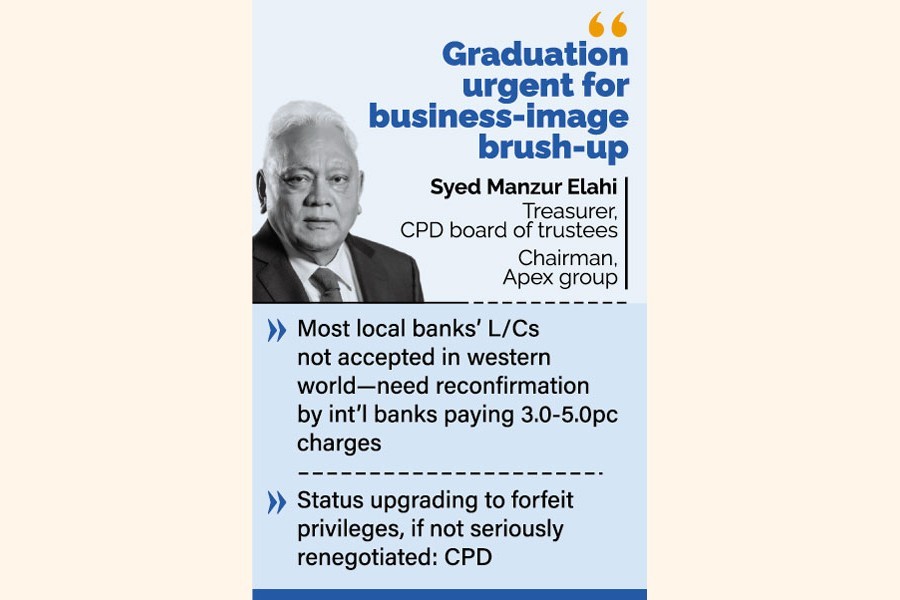Bangladesh prepares to propose at the upcoming WTO meet continuity of preferential trade treatment for six to nine years after graduating from the LDC status so that the country is not suddenly exposed to open competition.
As per recent consensus of the LDC ministers, Bangladesh has decided to cut its expectations through shortening the post-graduation trade-preference tenure from previously-planned 12 years.
The fisheries and its fuel subsidy, agricultural issues, moratorium for e-commerce, domestic regulation on trade in services would also be kept on the agenda for discussion at the upcoming conference.
A four-member delegation of the Ministry of Commerce (MoC) would place the issues on the table at the 12th ministerial conference (MC12) of the World Trade Organisation (WTO), scheduled to be held on November 30-December 3 in Geneva, Switzerland.
Bangladesh is going to attend as a graduating LDC the WTO ministerial conference for the first time this year.
Director-General of the WTO cell of the MoC Md Hafizur Rahman shared government's priority points of discussion at a virtual dialogue on the upcoming MC12: Bangladesh's expectations and possible stance. The orientation programme was organized by the Centre for Policy Dialogue (CPD) and Friedrich-Ebert -Stiftung (FES) on Thursday.
Now, the country would place its proposals as LDC-graduating country, not for LDC-graduated ones, he said.
Addressing the programme as moderator, Syed Manzur Elahi, treasurer, CPD board of trustees, and Chairman of Apex group, said in the post-COVID period businesses have been facing queries relating to technological advancement, environment issues like reductions in carbon footprint and sustainability issues rather than price negotiation.
"Such issues were not in focus two years ago and more challenges may appear after graduating from LDC status after 2026," he forecast.
Mr Elahi, however, said whether graduation is preferred or not, the country needs this despite several upcoming challenges to improve sovereign guarantee or credit rating.
"Exporters face image problem of LDC due to natural disaster and political instability, even though offering big discount. Buyers remained hesitant on delivery of the products and sustainability of production," he added.
Import letters of credit (L/C) of most of the local banks are not accepted in the western world and it has to be reconfirmed by the international banks like HSBC, City Bank NA paying 3.0-to 5.0-per cent charges, he said about the business status of a member of world's poor-country club or LDCs.
"We have to develop capacity, technical know-how to negotiate from position of strength, not weakness," he observed to underscore the urgency of image change through the UN-set process of LDC graduation.
The top businessman, also adviser of a caretaker government, lamented that the revenue authority is extremely revenue-oriented rather than investment-oriented.
He pointed out high tax incidence on tech sector, to back up his observation.
He said export diversification and developing human-resource capacity are important as around $10 billion has been remitted out of the country through formal and informal channel by foreign workers.
Prof Rehman Sobhan, chairman of the CPD, who chaired the programme, said human rights and nature of electoral system are important issues too on trade preferences.
Economics is no longer a principal factor in determining trading relations but variety of political considerations play major role now, he noted about correlation between geopolitics and economy of the day. "Research should be done on changing world trading and economic organs where we are going to be graduated," he said.
Prof Mustafizur Rahman, distinguished fellow at the CPD, made a keynote presentation at the programme with a number of recommendations as point of discussions at the upcoming conference. He said protectionism measures on trade aspects have been increased in many countries owing to the coronavirus pandemic.
"Bangladesh has to face dual challenges now--whether it would place proposals for LDC-graduating or-graduated countries," he said, indicating a graduation-policy paradox.
The economist pointed out that existing flexibility on global and domestic trade rules would not be in vogue after LDC graduation. Providing subsidy to domestic industries as well as non-reciprocity in tariff concession in the global space would not be continued, he said to specify the loss-gain arithmetic of the socioeconomic status change.
Also, the country might face difficulties in availing international support mechanism and exploring the ways of bilateral and regional trade agreements.
"Around 70 per cent of the country's export is based on preferential treatment that may face a blow," the policy exponent told the preparatory meet.
Among the 12 eligible LDC-graduating countries, Bangladesh would be worst victim unless it takes sufficient preparation from now on, he forewarned.
He said the G90 group proposals are important for offering special and differential treatment to the LDCs.
Dr Rahman suggested prioritizing domestic homework to ensure transition from preference-driven competitiveness to skills-and productivity-driven competitiveness.
Dr Nazneen Ahmed, country economist of the United Nations Development Programme (UNDP), Bangladesh, said the finding of government subcommittee on LDC-graduation aspects have to be reflected well in the upcoming MC12 deliberations.
Bangladesh Garment Manufacturers and Exporters Association (BGMEA) president Faruque Hassan said the first priority of exporters at the MC12 is extension of LDC-graduation transition time considering competitiveness.
"We have to focus on intraregional trade agreement," the export-industry leader told the preparatory meet in the run-up to the WTO conference on latest issues of global trade.
Dr Khondaker Golam Moazzem, Research Director of CPD, said the country have to place the proposals considering interest of LDCs as well as have to keep in mind post-graduation impact.
Former member of Bangladesh Trade and Tariff Commission (BTTC) Dr Mostafa Abid Khan said Bangladesh should try to keep the preferential treatment alive in the MC12 declaration.
Mr Hafiz of the MoC said Bangladesh would place the proposals in the upcoming conference to see a positive decision in this regard in next MC13.
In welcome remarks, Shadhan Kumar Das, programme co-coordinator, said FES is supporting Bangladesh to develop negotiation capacity in international forums.


